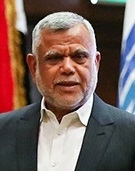Hadi al-Amiri
Hadi al-Ameri | |
|---|---|
 | |
| Member of Parliament | |
| Assumed office 1 July 2014 | |
| Minister for Transport | |
| In office 21 December 2010 – 8 September 2014 | |
| Prime Minister | Nour al-Maliki |
| Preceded by | Amer Abdoljalil |
| Succeeded by | Baqir Jabr al-Zubeidi |
| President of the Badr Organization | |
| Assumed office 16 July 2009 | |
| Preceded by | Baqir Jabr al-Zubeidi |
| Personal details | |
| Born | July 1, 1954 Diyala, Iraq |
| Political party | Badr Organization |
| Other political affiliations | Fatah Alliance |
| Alma mater | University of Baghdad |
| Military service | |
| Allegiance | |
| Branch/service | |
| Unit | File:Badr Organisation Military flag.svg Badr Brigade |
| Battles/wars | Iran–Iraq War 2014 Iraqi conflict |
Hadi Al-Ameri (Arabic: هادي العامري) is the former Iraqi minister of transportation and the head of the Badr Organization, which was the military wing of the Supreme Islamic Iraqi Council (SIIC). He is a member of the Iraqi parliament[1] under the United Iraqi Alliance list, which mainly represents religious Shi'a parties.
Amiri fought on the side of the Iranians, as part of the Badr Brigade, during the Iran–Iraq War.[2]
As leader of the Badr Organization, Hadi Al-Amiri had very close ties to the Iranian leadership—and in particular the Islamic Revolutionary Guard Corps, which was responsible for training the Badr Brigade during Saddam Hussein's rule.[citation needed] Hadi Al-Amiri was also one of the first Shi'a politicians to call for regional federation in the south of Iraq.[citation needed]
Amiri has denied claims that he has overseen flights passing through Iraqi airspace from Iran to Syria containing shipments of weapons to help the Syrian Government in the Syrian Civil War.[2] Amiri has however proclaimed his affection for Qassem Suleimani, the Commander of Quds Force, a division of the Islamic Revolutionary Guard Corps believed to be playing an instrumental part in supporting Syrian President Bashar al-Assad in the conflict.[2] Amiri told The New Yorker "I love Qassem Suleimani! He is my dearest friend."[2]
He was the commander of Iraqi forces in the operation to liberate Jurf Al Sakhar during 2014 Iraqi conflict.[3] As a commander in Popular Mobilization Forces, he has been active in the rest of operations against ISIL. He has been described as "perhaps the most powerful and pro-Iranian" leader in the Popular Mobilization Forces and often meets with Brett H. McGurk, US Special Presidential Envoy for the Global Coalition to Counter ISIL.[4]
See also
References
- ^ "Preview: Iraqi Official Reacts to U.S. Election". National Public Radio. 9 November 2006. Retrieved 2016-11-04.
- ^ a b c d Dexter Filkins, Dexter (30 September 2013). "The Shadow Commander". The New Yorker. Retrieved 27 September 2013.
- ^ Morris, Loveday; Salim, Mustafa (25 October 2014). "Iraqi forces press to secure Shiite south before religious observances believed to be target of Islamic State". The Washington Post. Retrieved 2016-11-04.
- ^ "As Islamic State withers, the alliance against it is fraying". The Economist. 31 August 2017. Retrieved 3 September 2017.
- ^ "America and Iran are jostling for influence over Iraq". The Economist. 12 April 2017. Retrieved 21 April 2017.
